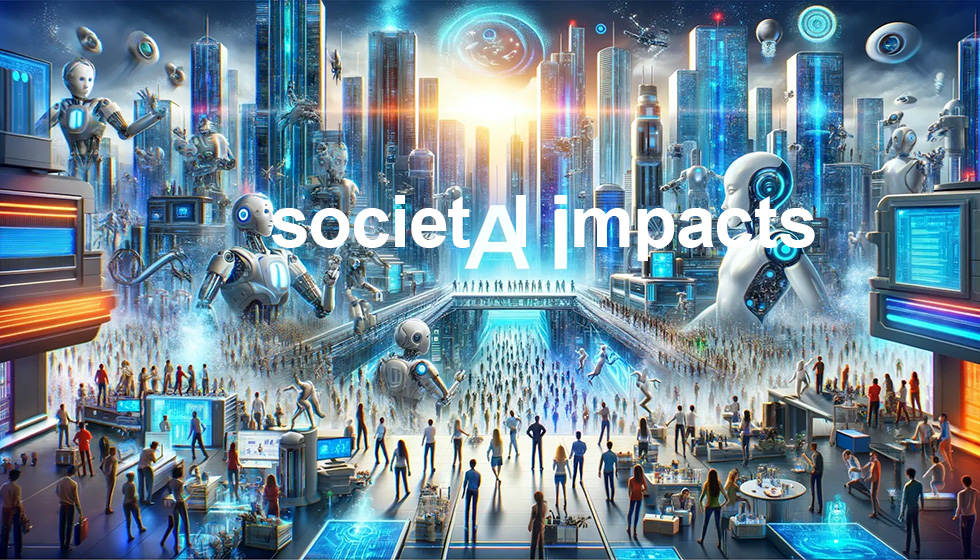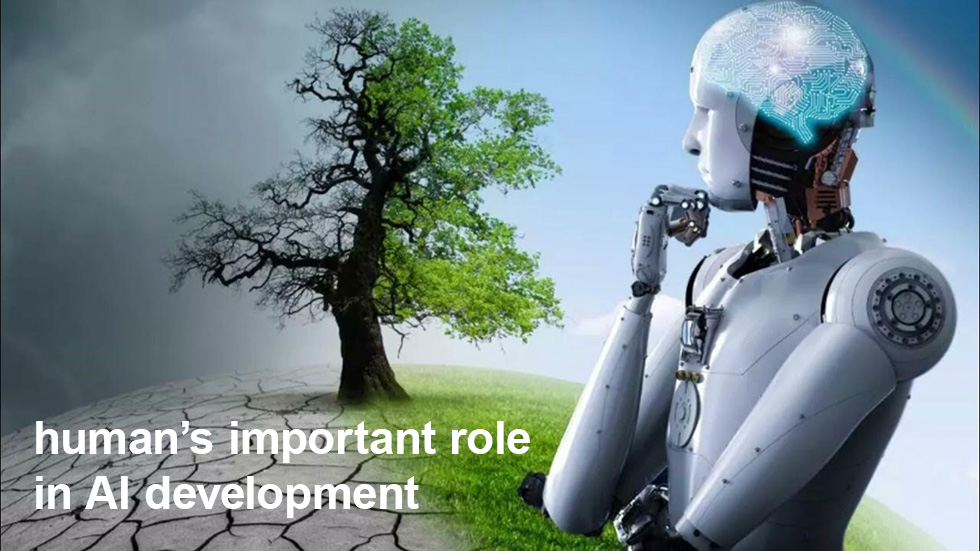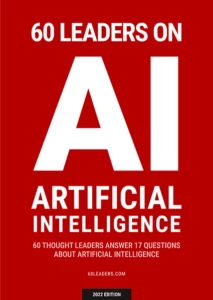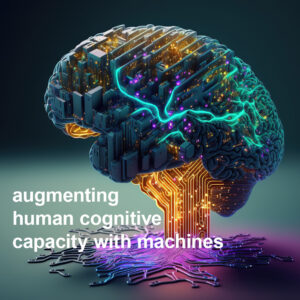AI’s Impact on Our Society and Everyday Life
In my previous blog post, I shared that I was very honored to be chosen as one of the 60 leaders on AI from all around the world to contribute to a very unique e-book, called 60 Leaders on AI. Each of the 60 thought leaders was asked to pick up to 3 questions (out of 17 most prominent questions) about AI that they are passionate about and provide their unique perspectives. Since there will be natural overlaps among the 60 leaders, which is a very heterogeneous group, this book provides a holistic view of AI with a healthy diversity of viewpoints from algorithm to ethics.
Since I am very keen to study the societal impact of AI, one of the questions I chose to answer is the following. Even though I wrote this about 2 years ago, I believe this perspective is still very relevant today and for the foreseeable future.
Artificial Intelligence is changing the world and the impact will be massive: on the way we work, we live, collaborate, decide, and act as a society.
Again, if you are interested in what others have to say about this question, you can read it HERE or download the entire FREE e-book. But here is my perspective.
Augmenting Humans with Machine Automation
Throughout the first three industrial revolutions, humans have learned to leverage machines to automate various tasks. We use machines to augment our limited physical strength, endurance, memory, and computing capability. However, no machines can augment our decision-making capability until recently. This is why most high-paying jobs in the post-industrial era involve skilled labor that requires substantial decision-making. Only the most mundane and mindless tasks are automated by mechanical machines. Yet, many of these machines still require human operators to make decisions, whether it’s as complex as driving a truck, or simply deciding when to switch a machine on and off.
Today, as AI-based technologies become more pervasive, machines can augment our cognitive capacity and automate our complex decision-making processes for the first time. This will dramatically change the way we work, leading to the Fourth Industrial Revolution. Many tasks that were reserved for humans and require some level of human decisions, can all be automated as long as we can collect enough data to train an AI to mimic those human decisions and actions.
One of the most significant benefits of AI is the huge efficiency it brings. Since many tasks can now be automated completely without humans being the bottleneck, they can be executed much faster. Moreover, since AI does not need to eat or sleep, it can work 24/7, leading to further productivity increase. As with any machine automation, AI can eliminate careless human errors, and provide greater consistency in our complex decisioning processes.
Individuals can benefit tremendously from AI, because it can eliminate the mundane and repetitive tasks that nobody likes to do. Whether it’s something as simple as deciding which movie to watch, adding items to our shopping list or having them delivered automatically, or getting home safely and quickly, AI can automate these tasks, allowing us to spend our valuable time on more important things. Not only do we get convenience and save time, we also get a better and more personalized experience.
The Business Impacts of AI
Now let’s expand our scope and look at AI’s impact on businesses. Today, many enterprises, especially large ones, have many inefficient or simply broken business processes (e.g. in customer service). These inefficiencies have many negative side effects on the business, as they often result in higher operating costs (e.g. hiring more human staff). Furthermore, when these processes touch their customers, the poor customer experience can erode brand equity and customer loyalty.
However, as with individuals, businesses can also realize the dramatic efficiency gain from AI. Fixing the inefficiencies in business can indirectly cut costs and improve customer experience. But beyond that, businesses can also improve their customer experience directly using personalization AI (e.g. recommender systems) and create more engaging brand interactions via conversational AI (e.g. chatbots and virtual assistants).
Unlike consumer AI tools that automate simple everyday decisions, business AI can be trained to automate decisions that are often highly technical, domain-specific, and have a much lower tolerance for error. Business AI is much less known to consumers because they are often used by specialized experts in specific business domains. They are used to augment human experts, not only to automate but also to optimize their high-stake decisions that often have a direct impact on the company’s top line (e.g. real-time dynamic pricing). Hence AI can also help enterprises improve margins, and revenues, and drive greater profitability.
The Societal Impacts: From the Optimistic to the Scary

Clearly, we are not there yet! Today, our AI systems are only capable of learning from specific data sources and automating point decisions in a narrow domain (i.e. artificial narrow intelligence, ANI). However, since technological progress occurs at an exponential rate, it won’t be too long until AI matches human intelligence (i.e. artificial general intelligence, AGI) or even surpasses it (i.e. artificial superintelligence, ASI).
When this happens, ASI could potentially rewrite themselves to make them even more intelligent faster. This positive feedback of intelligence would grow indefinitely, leading to more and more world-changing innovations at an increasing rate. Humans simply cannot adapt to those rapid and dramatic changes, let alone the existential threat of an ASI. This uncontrollable technological explosion is often referred to as technological singularity.
The Immediate Societal Challenges of AI
Although the looming singularity is frightening, It’s unfruitful to speculate about a knowingly unpredictable future that’s far away. Stemming from the mass adoption of AI, there are already many societal challenges that we must deal with long before we reach the singularity. As AI automates more human work in a market society driven by competition and profit maximization, it’s inevitable that companies will reduce their human workforce to cut costs. What will humans do then? Perhaps, we’ll need a new economy in the future that is driven by maximizing happiness rather than profit.
Since AI advancements progress at an exponential rate, it will be challenging to retrain and upskill the human workforce fast enough for them to keep stable jobs. Although technological innovation always creates more jobs in the long term, large-scale job displacement in the short term is a problem we must address. Moreover, if the pace of change is fast enough, our current education policy, where we front-loading education early in an individual’s life, may no longer be practical. So we may also need a new education system.
According to the renowned sociologist, Gerhard Lenski, technology enables more efficient production will lead to a greater surplus. This not only supports a larger society, it also allows members of a society to specialize more, thus creating greater inequality. Since the efficiency gained from AI is huge, the inequality it creates is also extreme. This is already very apparent in the income disparity between tech and non-tech workers across the globe.
Despite the appeal of UBI, it will likely further increase inequality as it would go to everyone equally regardless of their income. Some inequality is good, as it not only motivates people but also enables large-scale projects that require huge investments. However, too much inequality is definitely bad, as it leads to more crime, reduces social mobility, and undermines the fairness and trust of social institutions.
The Role of Humans in AI’s Development
What about the looming singularity and the existential threat? If you must squeeze a comment out of me on this matter, consider this: All AI systems learn from data. But these training data are created by humans, as they are digital records of our past actions and encapsulate our past decisions. So AI is really learning from us, humans, and AI will mimic our decision processes.

Therefore, if we ever run into a situation where our interests are in conflict with AI, the best way to ensure that AI doesn’t destroy us is for us to be better role models for AI now. That means we, as a human race, must learn to not kill each other whenever we run into conflicts. In short, the best way to ensure our survival, is for us to be better humans. We must learn to be more compassionate, more empathic, more environmentally conscious, etc. So our decisions and actions can be used to train an AGI (or ASI) that mimics these “better-human” qualities.
This may sound impossible in today’s society because we must compete and struggle for survival, which often brings out the worst of our human nature. However, in an AI-augmented future, we may not need to work for survival, and our economy may no longer be driven by competition. So with the help of AI, maybe we, as a species, can learn to become better humans before we reach the singularity.
Conclusion
In conclusion, the advent of AI marks a pivotal moment in human history, ushering in the Fourth Industrial Revolution with profound implications for individuals, businesses, and society at large. For individuals, AI offers liberation from mundane tasks, allowing for greater focus on meaningful pursuits and personalized experiences. Similarly, businesses stand to benefit from increased efficiency, enhanced customer experiences, and improved business outcomes.
As AI reshapes the economic landscape, challenges such as job displacement and inequality loom large. Moreover, as we contemplate on the arrival of AGI and beyond, the ethical imperative becomes clear. By fostering qualities of compassion, empathy, and environmental consciousness, we can guide the development of AI systems that reflect our best selves. Ultimately, the journey towards a future augmented by AI presents an opportunity for humanity to redefine its priorities and aspirations for a more harmonious coexistence with technology and each other.
DISCLAIMER: The content of this article was first published by 60 Leaders on AI. Here is the latest revision and a current rendition of the raw manuscript submitted to the publisher. It differs slightly from the originally published version.



